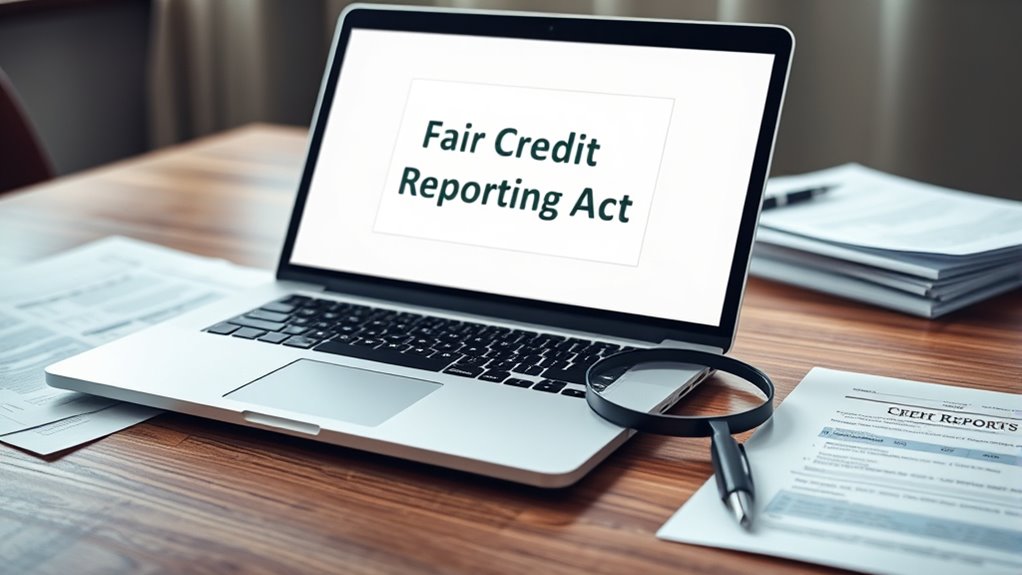Under the Fair Credit Reporting Act, you have the right to access free credit reports from Equifax, Experian, and TransUnion each year, and more frequently now through annualcreditreport.com. You can dispute errors, and credit bureaus must investigate within 30 days. Your personal information is protected and used only for permissible purposes like credit or employment decisions. If adverse actions occur due to your report, creditors must notify you. To explore how these protections work in detail, keep going.
Key Takeaways
- Consumers can access free annual credit reports from Equifax, Experian, and TransUnion, with weekly access available since September 2023.
- The FCRA grants the right to dispute inaccurate information and requires investigations within 30 days.
- Reports include credit, employment, tenant screening, and insurance data, protected by strict privacy rules.
- Consumers must be notified of adverse actions based on credit reports, with reasons and ways to contest errors.
- The law allows sueing for damages if credit reporting violations occur, ensuring accountability and consumer protection.
Your Right to Access Free Credit Reports

Did you know that under the Fair Credit Reporting Act (FCRA), you have the right to access your credit reports for free? You can request a copy of your report from each of the three major credit bureaus—Equifax, Experian, and TransUnion—once every year. This allows you to review your credit history, check for errors, and stay informed about your financial standing. Since September 2023, you can even get free weekly reports through annualcreditreport.com, making it easier to monitor your credit regularly. Taking advantage of this right helps you spot potential issues early and protect yourself from identity theft or inaccuracies that could impact your financial health. Remember, these reports are entirely free and available to you without any cost.
How to Dispute Inaccurate Information

To contest inaccurate information on your credit report, you should first identify and gather evidence of the errors. Next, submit a formal dispute to the credit reporting agency, explaining the issue and including supporting documents. After that, follow up to confirm the investigation is completed and the necessary corrections are made promptly. Remember that understanding your rights under the Fair Credit Reporting Act can help you navigate the dispute process more effectively. Additionally, being aware of effective fraud prevention tools can assist in protecting your credit information from unauthorized alterations. Knowing the different personality assessment tools, such as 16PF, can also help you better understand traits that may influence your financial behavior and decision-making. Being familiar with toilet flushing mechanisms can help you avoid unnecessary plumbing issues that might affect your household’s water usage and costs.
Initiate Dispute Process
Wondering how to correct inaccuracies on your credit report? First, identify the specific information you believe is wrong. Next, file a dispute directly with the credit bureau that produced the report—most offer online, phone, or mail options. Clearly explain the error and include supporting documents, like bank statements or letters. The credit bureau is required to investigate usually within 30 days. During the investigation, they will contact the data provider for verification. If they find the information is inaccurate, they must update or delete it. You’ll receive the results of the investigation and a free copy of your updated report if changes are made. Disputing inaccuracies promptly helps ensure your credit report accurately reflects your financial history.
Follow Up Procedures
Once you’ve filed a dispute with the credit bureau, it’s important to follow up to make certain your issue gets resolved. Check the credit bureau’s investigation status regularly, either online or via written communication. If the bureau takes longer than 30 days, contact them to request updates. Keep records of all correspondence, including dates, names, and details of your conversations or letters. If the investigation confirms the information is inaccurate or unverifiable, verify that the corrections have been made by obtaining a new copy of your credit report. If the issue persists or isn’t resolved properly, consider submitting a written statement of dispute to accompany your report or escalate the matter to the Consumer Financial Protection Bureau (CFPB). Staying proactive guarantees your rights are protected and your credit report remains accurate. Additionally, understanding Pimple Patch technology can help you better manage blemish treatment during disputes or routine skincare. Being aware of your dispute process rights ensures you can effectively navigate any challenges during the investigation. Recognizing the importance of accurate reporting can also motivate you to stay vigilant throughout the process. For example, documenting your efforts can strengthen your case if further action is needed. Remember that expiration dates on related documents can also play a role in verifying the timeliness of your dispute process.
Understanding the Scope of Consumer Reports

Understanding the scope of consumer reports is essential because these reports contain detailed information about your creditworthiness and personal data that can influence various financial decisions. Your credit report includes data on your credit accounts, payment history, outstanding debts, and credit scores. It may also cover employment background checks, tenant screening, insurance underwriting, and investigative reports. The Fair Credit Reporting Act restricts who can access this information and for what purposes, such as lenders, employers, and insurers with a permissible purpose. These reports can also include personal details like your name, address, and social security number. Resources and Tools are often used to gather and verify this information, ensuring accuracy and compliance. The Act also emphasizes data security measures to protect your sensitive information from unauthorized access. Broadly, consumer reports help entities assess risk but are limited to relevant, accurate, and legally permissible information to protect your rights. Additionally, the Act provides specific consumer protections to ensure your data is handled responsibly and transparently.
Privacy Protections and Permissible Uses of Data

How does the FCRA protect your personal information from unauthorized access and misuse? It limits who can access your data and under what circumstances. Only entities with a “permissible purpose” can obtain your credit report, such as lenders, employers, or insurers. The law also requires CRAs to implement security measures to safeguard your data and to destroy outdated or irrelevant information. Additionally, you must give consent before your report is accessed for specific purposes like employment screening. Users of your data must notify you when adverse actions are taken based on your report.
Here are four key protections:
- Access only for permissible purposes
- Security measures for data protection
- Consent required for certain uses
- Notice of adverse actions
What Happens When Adverse Actions Are Taken

When an adverse action is taken against you, the responsible party must notify you in writing and include the reason for the decision. You also have the right to contest any information in your credit report that you believe is inaccurate or incomplete. Understanding these rights helps you respond effectively and ensure your credit report reflects accurate information. Being aware of data privacy challenges options can also help you avoid potential issues that could impact your financial stability.
Notification Requirements
Whenever an adverse action—such as a denial of credit, employment, or insurance—is taken based on your credit report, the Fair Credit Reporting Act requires the entity responsible to notify you promptly. This notice must include specific information to help you understand why the decision was made. To guarantee transparency, the responsible party must:
- Identify the credit bureau or source providing the report.
- Explain the specific reasons for the adverse action.
- Inform you of your right to obtain a copy of your report.
- Provide instructions on how to dispute or correct the information if you believe it’s inaccurate.
- User consent is essential for organizations to comply with the notification requirements and to ensure that you are aware of your rights. Integration with email marketing tools can help organizations automate and streamline notification processes, ensuring timely compliance with these requirements. Clear communication practices, including proper documentation, are also vital to uphold consumer rights and maintain transparency. Additionally, the accuracy of the data used in the report is crucial for fair decisions, emphasizing the importance of data accuracy in the process. Ensuring the timeliness of notifications helps maintain trust between consumers and reporting agencies, fostering a fairer credit system. This process helps you understand the basis of the decision and gives you the opportunity to take corrective action if necessary.
Right to Dispute
If an adverse action like a credit denial or employment rejection occurs based on your credit report, you have the right to contest the information that led to that decision. You can request the credit bureau to investigate the disputed items, and they are required to do so within 30 days. During this process, they will contact the data furnisher—such as a creditor or lender—to verify the accuracy of the information. If the investigation finds errors or outdated data, the bureau must correct or delete the information promptly. You can also add a statement of dispute to your report to explain your side. This process ensures that inaccurate or incomplete information doesn’t unfairly harm your credit or employment prospects. Additionally, ensuring your credit report is accurate can help you access better payment processing options and protect your financial interests. Maintaining up-to-date and accurate credit information is crucial for safeguarding your financial reputation and rights under the law.
Enforcement and Remedies for Violations

Enforcement of the Fair Credit Reporting Act (FCRA) relies on federal agencies like the Federal Trade Commission (FTC) and the Consumer Financial Protection Bureau (CFPB), which oversee compliance and take action against violations. If you experience a violation, you have legal options. The agencies can investigate complaints, issue fines, or enforce corrective actions. You also have the right to sue for damages. Remedies for violations include:
Federal agencies like the FTC and CFPB enforce the FCRA and can take action against violations.
- Actual damages for harm suffered
- Statutory damages up to $1,000 per violation
- Punitive damages in cases of willful violations
- Attorney’s fees for successful lawsuits
These measures aim to protect your rights and ensure accountability. Enforcement helps maintain the integrity of credit reporting practices and safeguards your privacy.
Frequently Asked Questions
How Often Can I Request a Free Credit Report Beyond the Annual Limit?
You can request free credit reports weekly from each of the three major credit bureaus starting September 2023. This means you’re no longer limited to just one free report annually. Take advantage of this benefit to monitor your credit regularly, spot errors, and protect yourself from identity theft. Just visit AnnualCreditReport.com or the bureaus’ websites to access your reports as often as you’d like, without any cost.
What Constitutes a Permissible Purpose for Accessing My Credit Report?
Did you know that over 70% of consumers are unaware of who can legally access their credit reports? A permissible purpose is a valid reason allowed by law for someone to view your report, like applying for a loan, employment, or insurance. You must give consent for certain accesses, and entities must have a legitimate reason, such as evaluating your creditworthiness or verifying your identity, to legally review your report.
Can I Prevent Certain Information From Appearing on My Credit Report?
You can’t directly prevent specific information from appearing on your credit report, but you can dispute outdated or incorrect data to have it corrected or removed. Regularly check your reports for errors and file disputes with the credit bureaus if you find any. Additionally, practicing good credit habits helps minimize negative info, but you can’t selectively hide accurate data that lenders are legally permitted to report.
How Does the FCRA Protect My Data From Unauthorized Third-Party Access?
The FCRA safeguards your data from unauthorized third-party access by limiting who can see your credit information to those with a “permissible purpose,” like lenders, insurers, or landlords. It requires CRAs to follow strict security procedures, ensure confidentiality, and destroy outdated data. You’re also entitled to notice and consent before your report is accessed for certain reasons, helping keep your information private and secure from unauthorized use.
What Are My Options if a Credit Bureau Refuses to Correct My Report?
You can escalate the issue if a credit bureau refuses to correct your report. Start by filing a formal dispute and requesting a detailed investigation. If they still decline, you can contact the Consumer Financial Protection Bureau or file a complaint with the Federal Trade Commission. Additionally, you may consider consulting a consumer rights attorney to explore further legal options, ensuring your credit information is accurate and fair.
Conclusion
So, after all this, you’d think knowing your rights under the Fair Credit Reporting Act would be enough to keep your credit safe. But the irony? Despite all the protections, errors still slip through, and sometimes, you have to fight to get things right. It’s like having a shield that’s a little chipped—still useful, but not perfect. Stay vigilant, and remember, your rights are there to help you, even when the system doesn’t make it easy.









